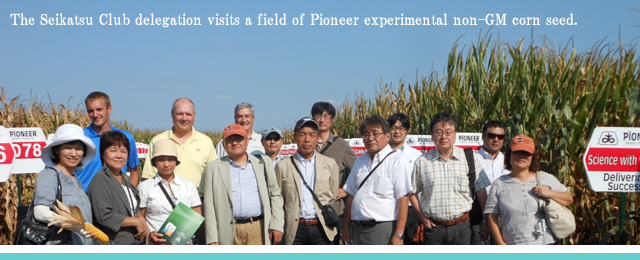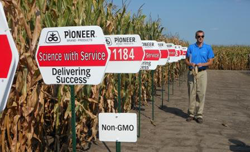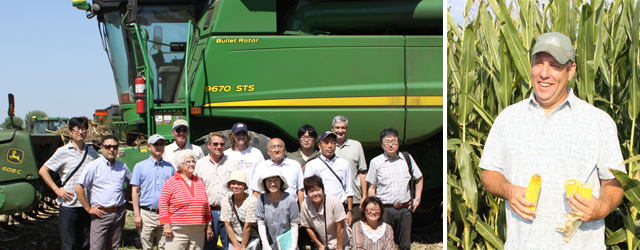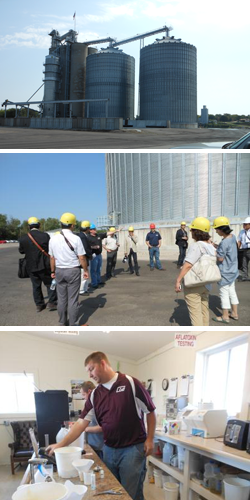Non-GM Seed Production Assured in the US
Non-GM Seed Production Assured in the United States

The Seikatsu Club has a basic policy of avoiding genetically modified (GM) crops and food, including animal feed. It buys non-GM corn from the United States in a partnership with JA Zen-noh (the National Federation of Agricultural Cooperative Associations). Members of the Seikatsu Club have taken tours to the United States every year since 2008 to examine the segregation of non-GM corn and share experiences with corn growers. From August 27 to September 3, a delegation of the Seikatsu Club visited one of the biggest seed companies, Pioneer, and corn growers to learn about the current state of the "Partner Plus Seed Program," which was agreed upon by the company, Zen-noh, CGB (the local grain handler) and the Seikatsu Club Consumers' Union (SCCCU). They also learned about the consequences of the drought and verified the situation with the identity preserved handling of non-GM corn. (Posted on 17 December 2012)
Non-GM Seed Supply Continues
 The seed partnership program is based on a contract that ensures Pioneer's seed development and supply of non-GM corn. The Pioneer company will produce non-GM seed for five years from 2010 to 2014 to meet Seikatsu Club's demand. On the first day of the tour, Pioneer told the delegation that it positions its non-GM seed supply as an important part of its business. It usually takes two years for Pioneer to develop and commercialize their seeds. As the Seikatsu Club places orders in advance, the company can provide farmers with information in advance. This makes it easier for them to make plans for cropping and seed production. In order to develop seeds more effectively, the company plans to reduce non-GM seed varieties from 43 to 25. In response to the delegation's statement that the Seikatsu Club is determined to continue buying non-GM corn, the company said non-GM corn seed will be developed and supplied as long as there is a demand. It pledged to maintain its non-GM seed supply until 2014, as contracted.
The seed partnership program is based on a contract that ensures Pioneer's seed development and supply of non-GM corn. The Pioneer company will produce non-GM seed for five years from 2010 to 2014 to meet Seikatsu Club's demand. On the first day of the tour, Pioneer told the delegation that it positions its non-GM seed supply as an important part of its business. It usually takes two years for Pioneer to develop and commercialize their seeds. As the Seikatsu Club places orders in advance, the company can provide farmers with information in advance. This makes it easier for them to make plans for cropping and seed production. In order to develop seeds more effectively, the company plans to reduce non-GM seed varieties from 43 to 25. In response to the delegation's statement that the Seikatsu Club is determined to continue buying non-GM corn, the company said non-GM corn seed will be developed and supplied as long as there is a demand. It pledged to maintain its non-GM seed supply until 2014, as contracted.
Ms. Sachiko Matsuura, a member of SCCCU Consumption Committee who participated in the delegation said, "We are able to secure non-GM corn to feed our pigs, cows and chickens because we have asked farmers in the United States to grow it. The pre-order structure of non-GM corn is based on the Seikatsu Club assurance that we will continue to consume meat and processed meat products from animals fed with non-GM feed. I felt we should increase our consumption of our own products in order to promote our non-GMO movement.”
The delegation visited three non-GM corn growers and learned about their prospects for the harvest and consequences of the drought. Mr. John Caplin, who produces non-GM corn and soy beans, said, "I don't need to grow GM corn. As long as you want non-GM corn, I am going to grow it,” and added that he has a plan to increase his non-GM corn production. After visiting his farm, Ms. Momoko Toda, a member of the Seikatsu Club Liaison Committee on GM Food said, "I saw many cobs which had very few kernels, but I was relieved to learn that they were not withering and dying.”

Lower Harvest is Expected Due to Drought
 The delegation also visited facilities run by the CGB Enterprises, which belongs to the JA Zen-noh Group and is in charge of handling non-GM corn for the Seikatsu Club. Unfortunately, the visit to grain elevators operated by Zen-noh Grain(New Orleans, Louisiana) to check the identity preserved handling was canceled due to a hurricane. However, the delegation saw silos and other facilities in Hennepin and Naples in Illinois to verify that the non-GM corn is securely segregated from GM. In addition, they learned about the yield, quality and handling of corn. When corn is unloaded from trucks, it is stringently tested to prevent GM contamination. “People were concerned about the level of aflatoxins (a group of chemicals produced by certain mold fungi) in corn. They conduct regular tests to detect GM and aflatoxins. The inspectors looked like they were doing the tests for the toxins very seriously,” Ms. Matsuura said.
The delegation also visited facilities run by the CGB Enterprises, which belongs to the JA Zen-noh Group and is in charge of handling non-GM corn for the Seikatsu Club. Unfortunately, the visit to grain elevators operated by Zen-noh Grain(New Orleans, Louisiana) to check the identity preserved handling was canceled due to a hurricane. However, the delegation saw silos and other facilities in Hennepin and Naples in Illinois to verify that the non-GM corn is securely segregated from GM. In addition, they learned about the yield, quality and handling of corn. When corn is unloaded from trucks, it is stringently tested to prevent GM contamination. “People were concerned about the level of aflatoxins (a group of chemicals produced by certain mold fungi) in corn. They conduct regular tests to detect GM and aflatoxins. The inspectors looked like they were doing the tests for the toxins very seriously,” Ms. Matsuura said.
According to CGB Enterprises, the yield would be lower, and the handling and logistic costs are becoming larger due to the drought. It is taking more time to transport corn because the water levels of the rivers have dropped and therefore barges have a smaller load capacity.
After the tour, Ms. Tomoko Kudo, a member of the SCCCU Consumption Committee stressed that “There will possibly be more demand for drought-tolerant GM corn. But we are working to stay non-GM because we wish to restore our control over food rather than allow large corporations to control the seeds. The seed company Pioneer, farmers in the United States, and the grain handler JA Zen-noh agreed to the contract because we are committed to consuming non-GM corn. This enables a stable non-GM corn supply. We need to have a stronger bond with these people in order to prevent GM corn cultivation expanding. In order to make this happen, we have to learn about the reality of producing non-GM corn and encourage more people to consume our products.”
生活クラブをはじめませんか?
42万人が選ぶ安心食材の宅配生協です
ウェブ加入限定 無料プレゼント






